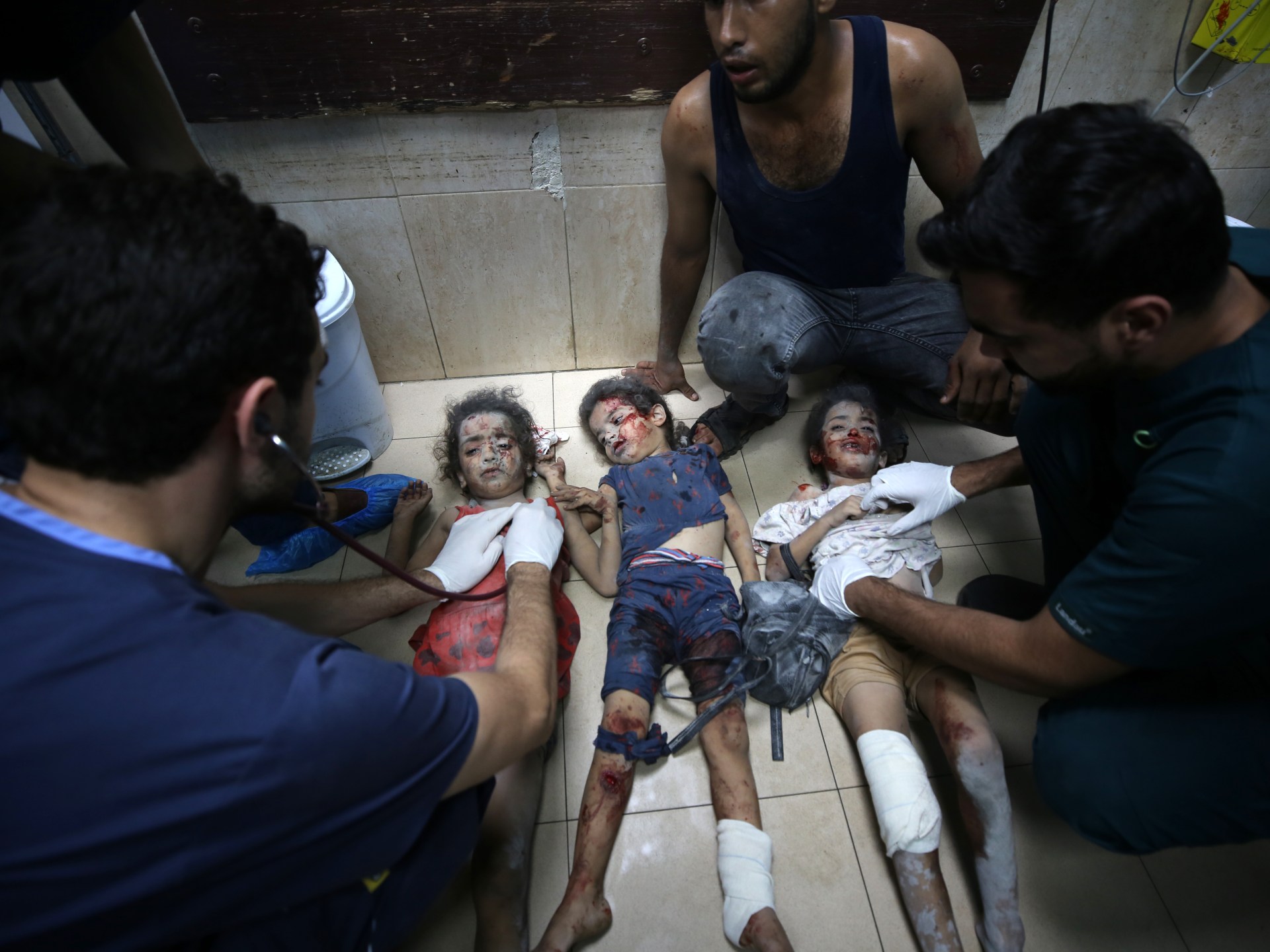
Bodies littered the road out of El Geneina, a town in western Sudan, when Dr. Rodwan Mustafa and his family sped along a bumpy road that led to the Chad border and, they hoped, safety.
A day earlier, angry Arab militiamen had killed Dr. Grabbed Mustafa by the throat and accused him of providing medical care to enemy fighters. That was his signal to run.
As he and his family raced to the border in the car, he saw chickens clucking over the bloody corpses of those who had not escaped in time. A camp for displaced people stood empty and burned down. He spotted a dismembered hand on the side of the road.
“The smell of death was everywhere,” said Dr. Mustafa, who made it to a refugee camp in Chad and made phone calls from there.
Seven months later The devastating civil war in SudanNew horrors have accompanied recent fighting in Darfur, a sprawling region in the west of the country where a powerful paramilitary group, the Rapid Support Forces, has won a series of resounding victories over the regular Sudanese military in recent weeks.
After capturing three of Darfur’s five state capitals, including El Geneina, on November 4, the paramilitary group is close to conquering the entire region, say residents, analysts and U.N. officials interviewed in recent days.
Even as this shifts the war in favor of the paramilitary group’s commander, Lt. Gen. Mohamed Hamdan, neither side appears able to achieve complete victory, according to African and Western officials – a stalemate that has exacerbated civilian suffering . The RSF also achieved its most recent victories Costs of ethnic violence that reminds of the Genocidal massacres that brought global attention to Darfur just over two decades ago.
According to the organization, more than 800 people were killed earlier this month when RSF and allied Arab fighters overran the army garrison in El Geneina United Nations Refugee Agency. Houses were razed and United Nations aid supplies were looted, the agency said. Displaced Sudanese soldiers fled across the border into Chadwith ammunition supplies.
Aid workers and witnesses also reported sexual violence, torture and killings of members of the Masalit, an ethnic African group with a long history of conflict with ethnic Arabs.
“They came to massacre us,” said Ahmed Sharif, a teacher who fled El Geneina on November 5 and walked 13 hours to reach Chad.
Filippo Grandi, the head of the United Nations refugee agency, said: “Twenty years ago the world was shocked by the terrible atrocities in Darfur. We fear that a similar dynamic could develop.”
The dire situation is not yet a complete repeat of the early 2000s, when Arab militiamen’s scorched-earth tactics led the International Criminal Court to bring genocide charges against Sudanese leaders, including the former president. Omar Hassan al-Bashirwhich was canceled in 2019.
This time, diplomats and analysts say, the ethnic violence is a byproduct of the national struggle between forces loyal to the army chief, Gen. Abdel Fattah al-Burhan, and Gen. Hamdan, rather than a coordinated campaign of massacres.
The RSF wants to present itself as a responsible group that could one day rule Sudan. In an email response to questions, she blamed the Sudanese army for the recent deaths in El Geneina and accused it of bombing civilian neighborhoods. A formal investigation into possible abuses is underway, the group said.
But promises of transparency from a paramilitary group that grew out of the feared Janjaweed militias that terrorized Darfur in the 2000s are viewed with great skepticism. RSF officials privately admitted that undisciplined fighters had committed abuses, diplomats say. And in July, the International Criminal Court opened a new investigation into possible war crimes in Darfur.
Still, the dynamic could change quickly if other armed groups in Darfur currently on the fence decide to join the fight.
After months of bitter fighting in the Sudanese capital of Khartoum, where fighting first broke out in April, the Rapid Support Forces have turned their focus back to Darfur, the region where most of the group’s fighters originally come from. It captured Nyala, Sudan’s second largest city, Zalingei in central Darfur and El Geneina in quick succession.
Now the battle is raging in El Fasher, the army’s last stronghold in Darfur. If that falls, experts say, most of Sudan west of the Nile will be in RSF hands.
“El Fasher is the last big domino to fall,” said Alan Boswell, an analyst at the International Crisis Group.
The outcome of the battle depends in part on the decisions of Minni Minnawi, the regional governor of Darfur, whose forces are concentrated around El Fasher. So far they have avoided taking sides in the war. And although Mr. Minnawi is a long-time rival of the RSF, many doubt that his fighters now have the strength to confront the paramilitary group.
“Fighting seems like a bad thing for them to do,” Mr. Boswell said.
The changes illustrate how much ground the Sudanese military, long considered the backbone of the state, has lost in this war. Failing to expel the RSF from Khartoum, the military was forced to move most government functions to Port Sudan on the Red Sea in the far east of the country. Aid organizations and UN missions also work from there.
International efforts led by the United States and Saudi Arabia to negotiate a ceasefire have failed to find a compromise. Recent talks last week in Jeddah, Saudi Arabia, yielded little result. And the humanitarian costs are rising rapidly.
Until now, at least 10,400 people have diedmainly in Khartoum and Darfur, according to the Armed Conflict Location and Event Data Project, although Sudanese health workers say the actual number of casualties is most likely much higher.
Nearly five million people – about a tenth of Sudan’s population – have been internally displaced another 1.2 million have fled to neighboring countriesmainly Chad, South Sudan and Egypt.
According to the United Nations, half of Sudan’s 46 million people need help to survive.
A handful of aid organizations have returned to West Darfur in recent months after reaching agreements with the RSF and Arab militias. Its staff describe massacres of civilians, dozens of reported rapes, orphans and schools full of refugees.
Will Carter, the Sudanese director of the Norwegian Refugee Council, blamed the world for turning its back on Sudan. “The sheer number of deaths, the scale of devastation in Darfur and the lack of attention show how the international system is failing right before our eyes,” he said.
Ali Salam, an outreach coordinator with the Sudanese American Physicians Association, said he saw “unbelievable” things during a recent visit to refugee camps in Chad near the Sudanese border. A woman arrived at a camp with a dead child on her back, unaware that the child had died on the way, he said.
“In Darfur, people are dying like insects,” he said.
While events in the Middle East preoccupy the United States, which has had a major influence over Sudan for years, foreign powers accused of fueling Sudan’s war, such as the United Arab Emirates, face even less scrutiny. An investigation found that Emiratis were smuggling weapons to General Hamdan from a base in Chad or Egypt supporting the Sudanese military.
Two decades ago, the cause of peace in Sudan was embraced by Western celebrities and activists who held marches in Washington under the slogan “Save Darfur.” This time, many in Sudan feel the world has turned its back on them.
“How many more lives will it take for the world to step in and for people to care?” said Omnia Mustafa, a 21-year-old Sudanese woman (who is not related to Dr. Mustafa) who made the appeal on TikTok this week Make outsiders aware of their country’s plight.
“I’m tired of our suffering falling on deaf ears,” she said. “We are human too, like everyone else.”






Recent Comments